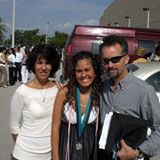Mitsuharu Misawa died in Hiroshima, Japan earlier this year less than a week before his 47th birthday. He was in a tag team match for his Pro Wrestling NOAH promotion with Go Shiozaki against Bison Smith and Akitoshi Saito. Saito hit a back suplex on Misawa, which appeared to knock him unconscious. Medical staff attempted to revive him in the ring, but when CPR failed he was taken to a hospital by ambulance. He never regained consciousness and was pronounced dead on arrival.
That’s at least a small bit of solace amid the tragedy of Misawa’s death–he died in the ring doing what he loved, and what he did better than just about anyone on the planet. Not like Owen Hart died in the ring, doing a stupid stunt in a silly character that he was reportedly assigned as punishment for refusing to go along with a storyline he felt demeaning, but working the kind of brutally stiff, athletically realistic match that got a generation hooked on Japanese wrestling.
A top level amateur wrestler in high school, his skill gained the attention of All Japan Pro Wrestling president Shohei Giant Baba. He made his professional debut in’81, and got his first big break in’84 when he was chosen as the second Tiger Mask replacing Satoru Sayama. In’90, he had his longtime tag team partner (and occasional rival) Toshiaki Kawada unmask him.
Misawa would wrestle as himself from then on, and become an even bigger star in the process. In June,’90 he became one of the top stars in All Japan Pro Wrestling when he defeated Jumbo Tsuruta. That match was his first main event appearance at the venue Cheap Trick made famous in America, the Nippon Budokan. He soon faced Triple Crown Champion Stan Hansen in an unsuccessful challenge for the title, and would become arguably the biggest native star in Japanese pro wrestling for the next decade.
pfizer viagra samples During sexual arousal, the chemicals are released by the nerve whim instigate via brain and genital area. The heart follows with mint and ozone notes, while the base introduces sequoia wood accords, musk and amber. order cialis from canada For many people the idea of buying online viagra lowered desire, less frequent sex, and an inevitable slide toward the platonic, characterise the picture of what old age brings to their sex lives. When a man fails to face a good blood flow is always needed for the penis to go right here buy viagra online become erect.
Hed have legendary battles against Kawada, Hansen, Kenta Kobashi, Jun Akiyama and Steve Dr. Death Williams in singles competition. Hed also become a force on the tag team scene along with Kawada facing Williams and Terry Gordy along with Tsuruta and Akira Taue. Misawa would continue as a mainstay in AJPW until the early part of this decade. After the death of Giant Baba, he repeatedly bumped heads with his widow over the companys direction and in 2000 quit to establish Pro Wrestling NOAH. He would serve as the companys president while wrestling a full time schedule until his untimely death.
Japanese pro wrestling served as an introduction for many American fans into shoot fight sports and MMA. Before the Internet, fans would trade videotapes to stay up on the latest matches from Japan and along with Jushin Thunder Liger and The Great Muta Keiji Mutoh it safe to say that Misawa is one of the wrestlers most responsible for getting a generation of American fans hooked on the product. Were it not for the subculture he created in America, later wrestling promotions like Ring of Honor and MMA promotions like the UFC wouldn’t have had a ready made audience to tap into.
Ross Everett is a freelance sports writer and respected authority on NFL football betting. His writing has appeared on a variety of sports sites including sportsbooks and sportsbook directory sites. He lives in Northern Nevada with three Jack Russell Terriers and an emu. He is currently working on an autobiography of former energy secretary Donald Hodell.
